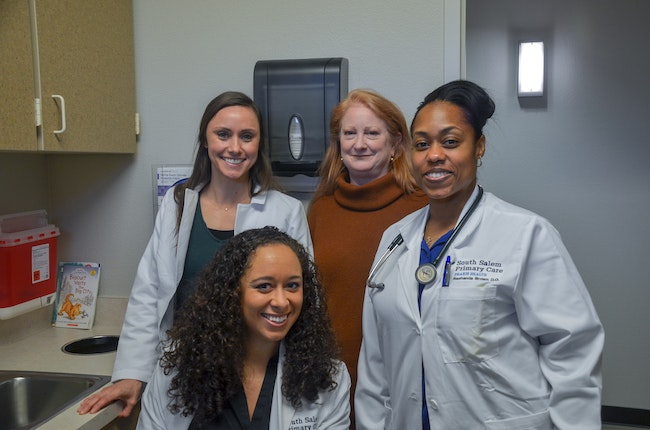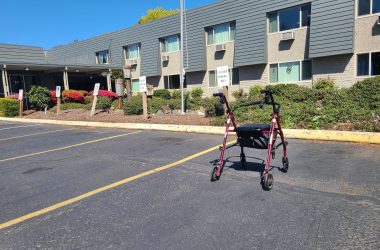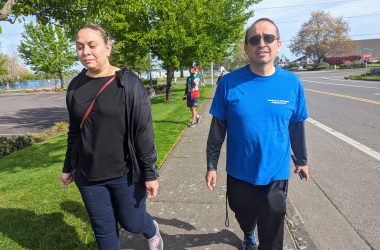 Dr. Rashanda Brown, front right, poses with the other practitioners at South Salem Primary Care in February 2020. The clinic opened with physicians assistants Christine Rue, front left, and Alyssa Schmidt, back left, and Dr. Paula Spencer (Rachel Alexander/Salem Reporter)
Dr. Rashanda Brown, front right, poses with the other practitioners at South Salem Primary Care in February 2020. The clinic opened with physicians assistants Christine Rue, front left, and Alyssa Schmidt, back left, and Dr. Paula Spencer (Rachel Alexander/Salem Reporter)
Dr. Rashanda Brown had always been “a little leery” of telemedicine, mostly because insurance companies pay providers less for a virtual visit than an in-person one.
But the past year has her hoping it sticks around.
Brown, who’s worked as a family medicine doctor in Salem for 11 years, had just completed a training on a telehealth platform when much of Oregon shut down last spring.
Though her clinic continued seeing patients in-person, Brown often found herself virtually “sitting at my patient’s kitchen table,” instructing people to move their arms in particular ways so she could identify problems.
“It was very gratifying, and I feel it gave us an opportunity to practice that old-school medicine that patients miss,” she said.
The past year has been a challenge for medical providers of all stripes, but Brown and her colleagues at South Salem Primary Care had an especially chaotic year.
The practice had just opened its doors in early February, with four providers and a vision of becoming a neighborhood doctor’s office that would eventually expand into imaging and other offerings.
Owned by Pendleton-based Praxis Medical Group, the new clinic formed when Brown and three other providers decided to venture out on their own. All had formerly worked for Salem-based WVP Medical Group and decided they wanted a change when Salem Health bought out WVP in the fall of 2019.
One year later, South Salem Primary Care has about 1,600 patients, clinic manager Mike Olson said.
“The last year of being in a pandemic has caused people to be a little hesitant to make a change or establish care,” he said. Now, that’s starting to turn around as more people get vaccinated against Covid and the pandemic appears to be winding down.
Olson said the clinic’s goal is to serve about 3,000 patients.
Brown said the pandemic put “a little bit of a hitch in our giddyup.” But being a new clinic proved an asset in some ways during the early weeks of the pandemic.
As other clinics cut in-person appointments to limit foot traffic, their office was still able to bring in patients who needed to be seen in-person because they weren’t as busy relative to the size of their office as other providers.
“We did not have the volume so we were able to space out and distance the patients naturally,” she said.
Brown said she had some patients who doubted the severity of the pandemic, though one skeptic remarked he’d avoided his annual sinus infection since everyone started wearing masks.
For her, the pandemic was a reminder of the limits of medicine, and an illustration of how important preventative care and overall health are in the face of a novel virus.
“We don’t have a cure for any virus – Covid, flu, HIV, none of them do we have cures for. But I think because of how much technological advancement we’ve had, folks forget that. They think I have an antibiotic or an antiviral that will cure it,” she said.
Not being able to visit her family in Michigan or meet friends in-person to recharge was difficult, she said, though her book club moved to online meetings.
“It’s been challenging. My faith definitely has sustained me and reminded me that you can only control what you can control and you can’t worry about the rest,” she said.
The wider adoption of telemedicine, and temporary state rules mandating equal pay for virtual services, benefitted many of Brown’s patients. Snowbirds who winter in Arizona could still see her for regular check-ups, as could college students away from home, she said.
Olson said the clinic staff are hopeful the Legislature will act to make those rules permanent.
Brown said she expects to see more interest from patients in preventative care going forward.
“I probably feel that more people are going to take their vaccinations seriously,” she said.
Contact reporter Rachel Alexander: [email protected] or 503-575-1241.
Salem Reporter counts on community support to fund vital local journalism. You can help us do more.
SUBSCRIBE: A monthly digital subscription starts at $5 a month.
GIFT: Give someone you know a subscription.
ONE-TIME PAYMENT: Contribute, knowing your support goes towards more local journalism you can trust.

Rachel Alexander is Salem Reporter’s managing editor. She joined Salem Reporter when it was founded in 2018 and covers city news, education, nonprofits and a little bit of everything else. She’s been a journalist in Oregon and Washington for a decade. Outside of work, she’s a skater and board member with Salem’s Cherry City Roller Derby and can often be found with her nose buried in a book.









